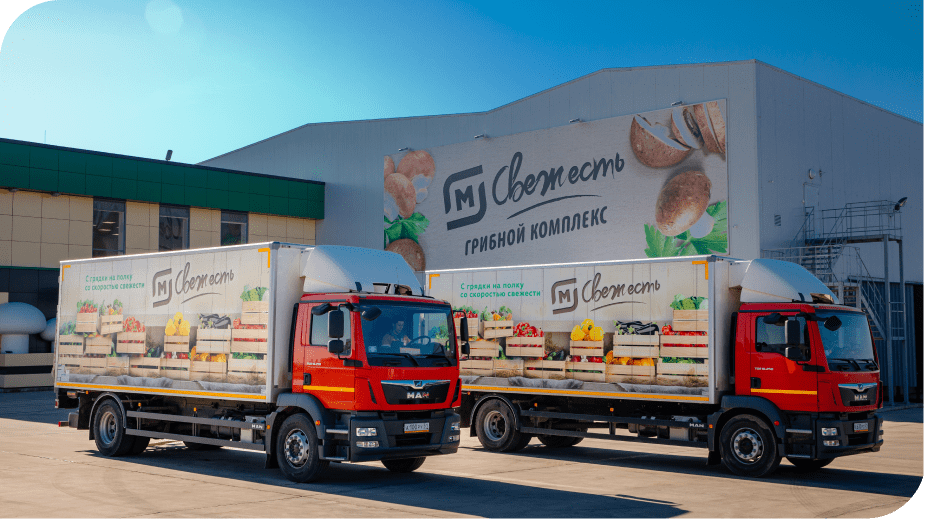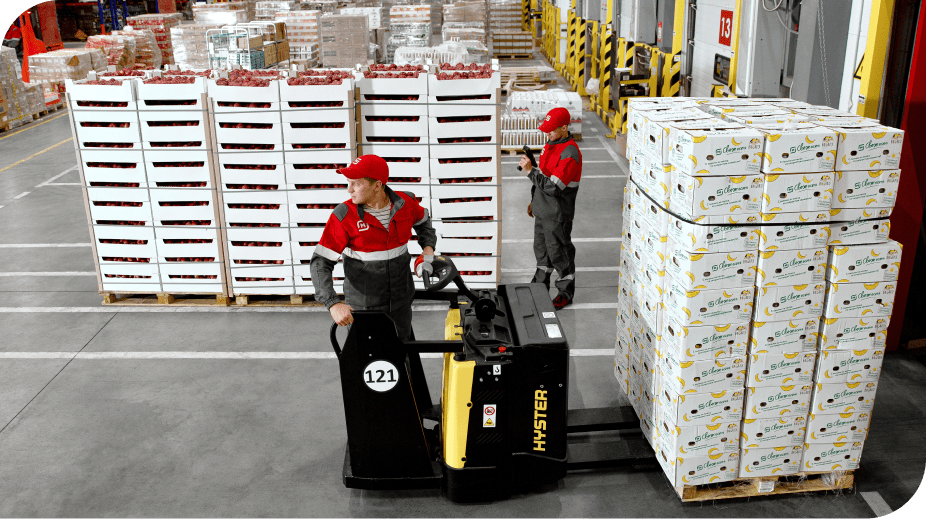Sustainable supply chain
Our supply chain consists of over 6,000 suppliers in Russia and abroad. We build open and transparent relationships with them, optimise procurement processes, improve logistics and test new ways of delivering products.
Our approach to management
GRI 2-6
We adhere to the following key principles when it comes to creating a responsible supply chain:
- sourcing products and raw materials responsibly
- managing the costs and increasing in-house production volumes to ensure high in-store availability and quality of goods and control the entire product chain
- maintaining the highest standards in our own agriculture and production
- promoting partner programmes with suppliers for the benefit of customers, developing options for cooperation with agricultural producers that are unique for the Russian retail, and providing support across the entire chain from field to shelf
- increasing the supply and presence of Russian products in our stores
- promoting economic inclusion: supporting small and local producers, increasing the offering of local products and providing effective support to the smallest producers across Russia
- evolving and optimising our logistics and delivery infrastructure to improve efficiency
- introducing green packaging standards for private label suppliers.
Material topics
- Building sustainable food production chains
- Building long-term multi-stakeholder partnerships to support the sustainable development goals
- Promoting stability of regional food markets
- Ensuring local and regional food security
Priority UN SDGs
National project
Principles of the Social Charter of the Russian Business
Business partnership and stakeholder engagement
Our relations with business partners are based on mutual respect.
Key documents
Internal regulations
- Responsible Supply Chain Policy
- Procedure for Selecting Suppliers through the System of Interaction with External Partners
- Procedure for Selecting Suppliers of Fresh Vegetables, Fresh Fruits and Berries, Fresh Mushrooms, and Herbs through the System of Interaction with External Partners
External documents
- Code of Good Practice of Relations between the Retail Chains and Suppliers of Consumer Goods


2022 highlights
- A record output of 395,000 tonnes from Magnit’s own facilities
- Launch of private label products for DIXY
- The share of Russian-made products in Magnit reached 95% in 2022
- Success of the long-term agricultural contract project, with the number of project participants, including farms, reaching 92
- Launch of an aggregator for centralised supply of farm products in the Tula region, which will increase the in-store presence of local products and provide effective support to the smallest farmers
- Implementation of the Voluntary Sustainable Packaging Standard jointly with the leading suppliers to reduce non-recyclable waste. In 2022, we held a series of webinars for 700 partners of our chain to fully brief them on requirements of the standard
- Transition to an end-to-end supply chain, which means faster delivery of goods and lower distribution costs
- Launch of the project to expand import logistics, including intermodal transportation of fruit and vegetables from Asia Pacific via the Far Eastern ports
- Entering into a cooperation agreement with the Potato Union, which brings together more than 90 domestic potato and vegetable market players. The agreement provides for the development and improvement of long-term direct contracts, allowing farmers to be confident in selling their produce and us to buy fruit and vegetables without intermediaries and control the entire production chain.
Governance structure
Supplier requirements
Our Responsible Supply Chain Policy includes a list of criteria that our suppliers are expected to meet. These include ESG requirements related to human rights, labour laws, and ethical and environmental requirements.
In 2021, we launched a project for independent ESG assessment and certification of our suppliers. The project was suspended in the reporting year, but we returned to it in 2023.
We voluntarily follow ISO 20400: Sustainable procurement, which provides guidance on integrating sustainability into the procurement function and helps reduce our environmental footprint, improve supplier relationships and minimise risks across the supply chain.
Communicating with suppliers
No responsible supply chain can be built without partnership with suppliers, so we are constantly engaging with our counterparties. Magnit is focused on both the selection of suppliers and the development of long-term and productive relationships with them.
Methods of engaging with suppliers to establish a sustainable supply chain
- joint projects in new product development, including eco-goods and private label products
- informing suppliers about Magnit’s ESG requirements and sustainability training
- development and implementation of joint social projects
- automated interaction via digital systems that allow tracking goods and analysing supplier stock in our stores
- audits of production conditions involving Magnit and independent auditors (for more details, see the Quality in Control subsection).